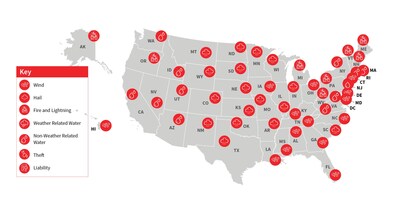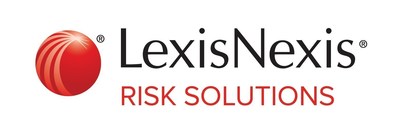PR Newswire
ATLANTA, Oct. 16, 2024
2024 LexisNexis Home Trends Report highlights why home insurance has increased for homeowners as loss costs across all perils rise for the fifth year in a row
ATLANTA, Oct. 16, 2024 /PRNewswire/ -- LexisNexis® Risk Solutions today released its ninth annual LexisNexis U.S. Home Trends Report, providing an updated view of by-peril trends in the U.S. home insurance industry to help insurers make more informed business decisions to be better positioned for profitable growth, and help them educate consumers on home insurance trends that impact their policies. In addition to insights into loss cost, frequency and severity, the report includes details about seasonality, distribution of catastrophe claims and geographic trends.
Key Takeaways
- All Peril lost cost and frequency increased by 4.1% and 11%, respectively, from 2022 to 2023 and 52% and 16.9%, respectively, since 2019.
- While severity has declined 6.3% since 2022, it remains 29.8% higher than 2019 figures.
- Catastrophe claims represented 46% of claims across all perils combined in 2023, the highest in seven years.
- Hail loss cost increased 57.9% since 2022, along with frequency (up 53.6%) and severity rising 2.8% year over year from 2022. States with the highest impact of hail-related perils include Colorado, Nebraska and Wyoming.
- Lost cost for other weather-related perils declined across Fire and Lightning (down 11.1%) and Weather-Related Water (down 51.4%) from 2022-2023. Non-Weather-Related Water loss cost decreased by 11.2% in the same period but remained on an upward trend over the past seven years.
"In the last year, the U.S. saw several historic-level weather disaster events and the highest level of catastrophic claims across all perils we've seen in the past seven years, which contributes to rising premiums that consumers across the country face right now," said Cole Winans, vice president, home insurance, LexisNexis Risk Solutions. "As home insurance carriers continue to contend with seasonal and geographic variabilities related to climate – in addition to rising inflation, material and labor costs – understanding by-peril and macro level home insurance trends coupled with maintaining extensive data and imagery on current house conditions over an extended period of time is imperative to remain nimble in today's volatile and dynamic market. Even as more insurers are likely to see rate increases approved in certain states in the coming months, they will need to be discerning in writing new business only in those pockets where they can do so profitably and that will be on a carrier-by-carrier and state-by-state basis."
All Peril Trends
- The U.S. home insurance industry has experienced an upward trend in loss cost across all perils combined over the past seven years. These figures include all perils highlighted below: hail; wind, water, fire and lightning; and non-weather related claims such as water leaks, thefts or liability.
- Despite the severity reduction in 2023 (6.3% down from 2022), severity's elevation above 2019 (up 29.8%) points to the importance of long-term trend data when evaluating risk and pricing.
- Colorado ranks highest in loss cost from catastrophic claims (274% above 2023 U.S. average catastrophic loss cost), while the severity of claims (dollars lost, on average, per claim paid) in Hawaii was well above any other U.S. state in 2023 (63% above 2023 U.S. average severity).
- U.S. states with the highest combined catastrophe and non-catastrophe loss costs include Colo., Minn., Neb., La. and Iowa. Lowest ranking states include Mass., N.H., W. Va., Vt. and Maine.
A Year of Hail
- In 2023, the U.S. experienced 6,962 hail events, up 57.3% from 2022, with 71% of hail claims deemed catastrophic.
- With 28 weather and climate disasters in 2023, each surpassing the billion-dollar damage threshold, 17 were attributed to severe weather or hail events.
- Hail peril seasonality over the past seven years continues, with April, May and June observing the highest frequency and loss cost in 2023.
Wind, Water, Fire and Lightening Perils
- Wind peril frequency rose 14.8%, along with a loss cost increasing 0.7% from 2022-2023. Severity, by comparison, fell 12.3% year-over-year. Despite seasonal loss cost averages peaking in August and September over the past seven years, 2023 loss cost and frequency were highest in March.
- In 2023, 62% of Wind claims were deemed catastrophic claims, up from 52% the year prior.
- Fire and Lightning perils in 2023 saw decreases across loss cost (-11.1%), frequency (-8.6%) and severity (-2.7%) from 2022. However, catastrophic claims rose 7% from 2023, with the wildfire on the island of Maui, Hawaii, being one of the most damaging and deadly events in 2023.
- Weather-Related Water perils declined in 2023 with a reduction in loss cost (-51.4%), frequency (-25.5%) and severity (-34.8%). In 2023, 61% of weather-related water claims were catastrophic.
Non-Weather-Related Perils
- Addressing claims related to water damage, such as leaking pipes and appliances, Non-Weather-Related Water perils decreased across loss cost (-11.2%), frequency (-10.3%) and severity (-1.1%) in 2023.
- While Theft loss cost and frequency decreased by 14.2% and 15.8%, respectively, in 2023, severity rose by 1.9%, partially attributed to the rising cost of consumer goods such as high-end kitchenware.
- Despite the marginal increase in severity (0.2%), Liability peril decreased regarding loss cost (down 18.2%) along with frequency (-18.3%) in 2023.
- Other perils, including physical damage claims not included elsewhere, extended coverage, damage to property of others, etc., saw a frequency increase of 9.3% year-over-year. Loss cost, along with severity, both declined 10.7% and 18.3%, respectively, from 2022 to 2023.
"When we look at peril data over a seven-year span, it's increasingly clear that home insurers cannot rely on short-term trends alone to make fully informed decisions about their books of business and operational strategies," said George Hosfield, associate vice president, home insurance, LexisNexis Risk Solutions. "For example, while hail loss cost surged by 57.9% in a one-year observance, the longer-term trend shows consistent increases across all perils year-over-year. This emphasizes the need for carriers to consider broader historical data when evaluating risk and adjusting pricing strategies to help support their long-term profitability."
Download the latest LexisNexis U.S. Home Trends Report.
About LexisNexis Risk Solutions
LexisNexis® Risk Solutions harnesses the power of data, sophisticated analytics platforms and technology solutions to provide insights that help businesses across multiple industries and governmental entities reduce risk and improve decisions to benefit people around the globe. Headquartered in metro Atlanta, Georgia, we have offices throughout the world and are part of RELX (LSE: REL/NYSE: RELX, a global provider of information-based analytics and decision tools for professional and business customers. For more information, please visit www.risk.lexisnexis.com, and www.relx.com.
Media Contacts:
Chas Strong
LexisNexis Risk Solutions
Phone: +1.706.714.7083
[email protected]
![]() View original content to download multimedia:https://www.prnewswire.com/news-releases/lexisnexis-us-home-trends-report-highlights-impact-of-severe-storms-as-catastrophic-claims-climb-to-record-levels-302277309.html
View original content to download multimedia:https://www.prnewswire.com/news-releases/lexisnexis-us-home-trends-report-highlights-impact-of-severe-storms-as-catastrophic-claims-climb-to-record-levels-302277309.html
SOURCE LexisNexis Risk Solutions


